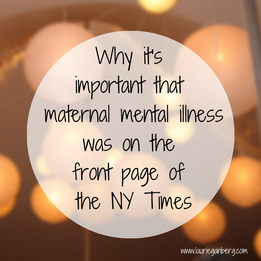 On 6/16/14, the NY Times published two articles on maternal mental health. This was above the fold, front-page media coverage for the emotional complications that mothers face. Let's talk about the cover story: 'Thinking of Ways to Harm Her': New Findings on Timing and Range of Maternal Mental Illness. First, a quick point about language. I don’t love that the headline led with the attention-grabbing reference to intrusive thoughts of harming a baby. And the article fell into the pattern of referencing either “postpartum depression,” which it makes the point of saying doesn’t accurately encompass the range of experiences, or “maternal mental illness,” which can come across as very medical. But the alternatives, like "perinatal mood disorders" or "emotional complications" have their limitations as well. So, I try to use a range to best speak to women's experiences. But back to the article... Women and families shared their experiences with depression, intrusive thoughts, and anxiety, demonstrating incredible vulnerability and courage. Writer Pam Belluck discussed the new research that backs up what clinical experience tells us: that emotional complications often start in pregnancy and are not easily identified as "just” depression, but frequently include overlapping features of depression, anxiety, obsessive compulsive disorder, and bipolar disorders. She touched on some of the factors that are associated with these experiences, the prevalence, and the range in timing when symptoms arise (during pregnancy and throughout the postpartum year). And there was mention of treatment: medications, therapy, support groups, and help to address impacts on bonding and attachment, though I wish there was more exploration of what treatment looks like for women and families. Belluck highlighted efforts to increase screening for postpartum mood disorders and the frustrating fact that more screening does not necessarily mean improved health: "A study in New Jersey of poor women on Medicaid found that required screening has not resulted in more women being treated...the law educated pediatricians and obstetricians, but did not compensate them for screening." In Massachusetts I am thankful that in Massachusetts we are taking some steps to increase screening. A 2010 law authorized the Department of Public Health to "develop a culture of awareness, de-stigmatization, and screening for perinatal depression." But changing a culture and eliminating stigma take time. Even if they are given a questionnaire, new moms often hide the truth of how they're feeling from their doctors and pediatricians out of shame and fear of judgment. And an OB who sees a woman for a mere 15 minute follow up appointment at 2 or 6 weeks postpartum may feel reluctant to ask further questions because they're unsure of where or to whom they would even refer her. The Massachusetts Child Psychiatry Access Project (MCPAP) aims to address some of these barriers by expanding its focus to include maternal mental health. Starting next month, doctors will be able to call a toll-free number to speak to a care coordinator to help find a mental health provider for their patient. MCPAP for Moms will be a great resource for doctors, but what about for mothers, their partners and families, and other providers? Granted there are some resources like the Massachusetts Postpartum Support International warmline (866-472-1897) and regional and community task forces creating systems of care for maternal mental health, but there are still gaping cracks women and families can fall through. What I’m most hopeful about in Massachusetts is a relatively small pilot project focused on preventing postpartum depression by putting postpartum doulas who can provide support and screenings in a few community health centers. A friend and colleague, Divya Kumar, Sc.M., is a certified postpartum doula and certified lactation counselor who works in one of these community health centers. Excited about the integration of services to address maternal health, Kumar says, “We need to change the way we do this...it's not just about preventing postpartum depression, but it's about promoting postpartum wellness and overall emotional health in new moms.” When a new mom brings her baby in for his well baby visit, Kumar is able to spend time with her helping with breastfeeding challenges, screen her for postpartum depression, and if needed, refer her to the mental health clinician down the hall who can see her that same day. And this is true even if the mother is not a patient of the health center. Plus, the community health center has midwives who also provide prenatal care so there’s the possibility for connection during pregnancy – important for the women who experience depression and anxiety during pregnancy and/or those who have a known mental health history. "Timely screening for perinatal emotional complications can save lives—especially in a community health center lucky enough to have comprehensive postpartum support AND mental health services right under one roof. [I am] so thankful for this pilot money and for centralized, accessible services," says Kumar, "We are offering services to families where the baby is seen at the clinic even if mom is not...We have caught a couple cases of PPD that way--huge, huge victories!" Until this pilot project can be replicated to reach more women, a woman (or someone in her family) needs the knowledge to recognize that what she's feeling isn't just new mom exhaustion, the courage to ask for help, and the resources to be able to find/afford/get to treatment. On top of all that, treatment must be specialized, connected to community-based supports, and welcoming. Dr. Kozhimannil, quoted in the article, speaks to the barriers: "There are also not enough treatment options…If a woman comes with a baby, and it’s a place treating people with substance abuse or severe mental illness, she may be uncomfortable.” (And yet, let's not forget that these are not mutually exclusive groups). When everything falls into place, it works. Timely, accessible treatment can help. As Jeanne Marie Johnson was quoted saying, once she received help, “It’s just a whole world of difference.” When I was looking for my office space, I thought about what it would be like for pregnant or new moms coming to see me. I looked for an office with an elevator, easy bathroom access, and parking. A chair that rocks for a breastfeeding mother, a hidden box of toys to distract an infant, water or a cup of tea to offer some comfort and hydration: these are all small ways I hope that the environment welcomes pregnant women and new mothers. And my connections to other resources—psychiatrists, acupuncturists, sleep consultants, lactation counselors, groups—form the foundation of a potential community of support for isolated new mothers and families. Ultimately, national media coverage of perinatal emotional complications like these NY Times articles helps to decrease isolation and stigma. I hope that this leads to more screening, more treatment, and more health for mothers and families. A bow of gratitude to the women who shared their stories and to Pam Belluck for writing these pieces. What's your take on the article? Please share in the comments.
Liz Reinke
6/19/2014 10:03:41 am
My colleagues have been astonished with how much attention maternal mental health/perinatal emotional complications has received this week! Many were not aware of its prevalence and it has created some great conversations. I agree with a lot of what you state in your blog about treatment because its not easy to access. Yet I am just so overwhelmingly happy that it made the front page for the NYT because it has created conversations that needed to happen a long time ago. I have also had many friends and acquaintances share their stories with me this week, stories they never told anyone else.
Laurie
6/19/2014 10:43:22 am
Thanks for stopping by, Liz. Yes, yes, yes! Media coverage like this lifts the veil on perinatal emotional complications. It allows women who've also struggled to say, "hey that happened to me to" or "that's happening now" without feeling so alone. Comments are closed.
|
Therapy, Groups, Supervision, Consultation, Training in Seattle, WA and online in Washington state
Laurie Ganberg, LICSW, PMH-C (#LW60673320) ~ Specializing in Perinatal Mental Health, Trauma, & Fat Liberation
Now practicing through Fiddlehead Therapy, PLLC with online services and in person in Mountlake Terrace, WA
Home | Privacy | Contact | Zoom Link
© 2019-2024 All rights reserved
Laurie Ganberg, LICSW, PMH-C (#LW60673320) ~ Specializing in Perinatal Mental Health, Trauma, & Fat Liberation
Now practicing through Fiddlehead Therapy, PLLC with online services and in person in Mountlake Terrace, WA
Home | Privacy | Contact | Zoom Link
© 2019-2024 All rights reserved
